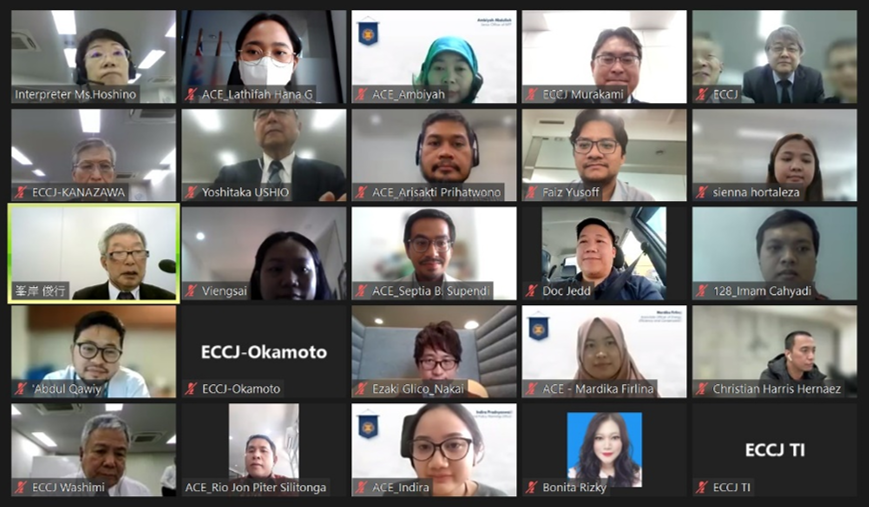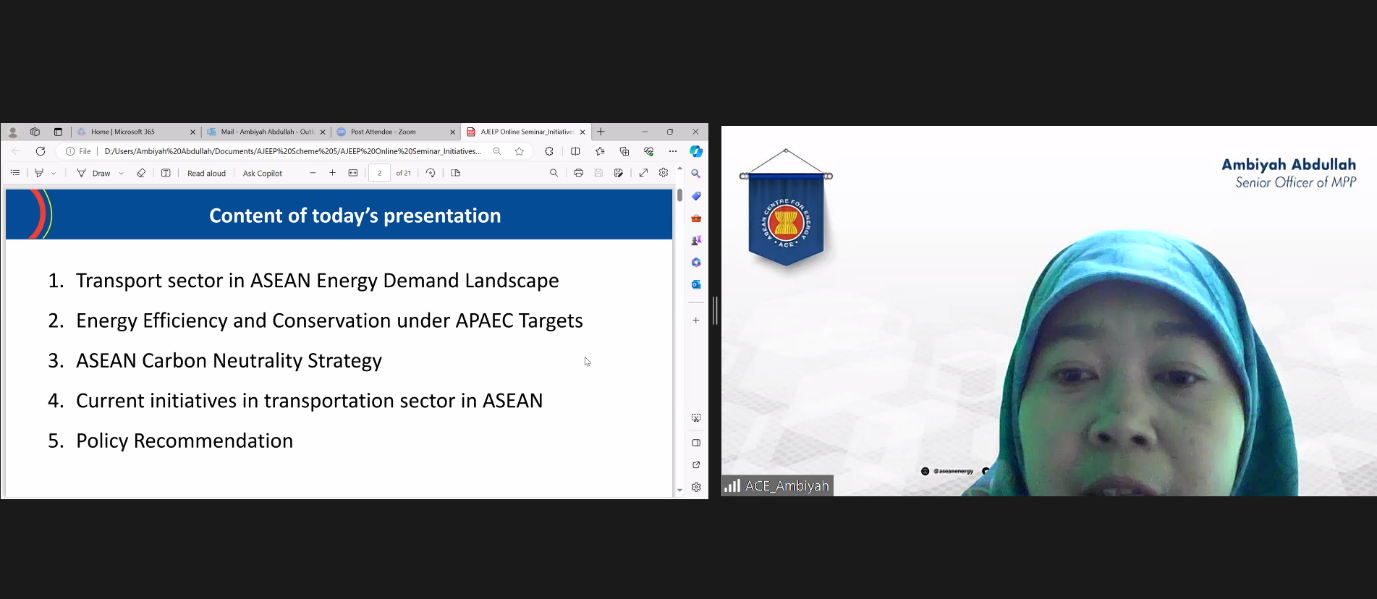Menu

Photo 1. Group Photo Session with the Online Seminar Participants
The ASEAN Centre for Energy (ACE), in partnership with the Energy Efficiency Centre Japan (ECCJ) under the ASEAN-Japan Energy Efficiency Partnership (AJEEP), a programme funded by the Ministry of Economy, Trade, and Industry (METI) of Japan, hosted a virtual seminar on “Carbon Neutrality in the Transportation Sector” on 19 December, 2023.
This seminar, aligned with the ASEAN Plan of Action for Energy Cooperation (APAEC) Plan, aimed to build capacity through online sessions. Participants engaged in discussions on best practices, challenges, and opportunities for Energy Efficiency and Conservation (EE&C) initiatives in achieving Carbon Neutrality (CN) within the transportation sector. A key focus was placed on green logistics, identified as an essential concept for ASEAN Member States to embrace and implement to ensure sustainable economic growth alongside efficient and environmentally friendly logistics systems.
The seminar pursued multiple objectives. Foremost among these was equipping ASEAN Member States (AMS) with knowledge of decarbonisation management systems and cutting-edge technologies relevant to achieving carbon neutrality in the transportation sector. Additionally, the event facilitated active discourse between participants and Japanese experts, offering a platform for exploring the latest technological advancements in decarbonisation efforts.
The seminar commenced with opening remarks from Motofusa Murakami, Managing Director of ECCJ. Highlighting the alignment of the presented initiatives with the goals of APAEC Phase II, Murakami emphasized how embracing decarbonisation efforts like those showcased in the seminar would propel ASEAN toward achieving its energy cooperation ambitions. Building on these points, Septia Buntara Suspendi, Acting Manager of the Conservation and Energy Efficiency (CEE) Department of ACE, underscored the critical role of innovative initiatives in realizing ambitious regional and national targets, including carbon neutrality measures within the transportation sector.
The virtual seminar on “Carbon Neutrality in the Transportation Sector” convened a diverse team of experts and practitioners from the logistics and transport industries to share innovative initiatives driving the region towards carbon neutrality. Dr. Ambiyah Abdullah, Senior Officer of Energy Modelling and Policy Planning (MPP) Department of ACE, set the stage by highlighting the critical role of decarbonisation efforts within ASEAN’s transportation sector.

Photo 2. Lecture by Dr. Ambiyah Abdullah, Senior Officer of MPP Department of ACE
The private sector followed suit, with representatives from Toyota Motor Corporation, EZAKI GLICO Co., Ltd., and SENKO Co., Ltd. showcasing successful initiatives that propelled their organisations toward carbon neutrality. The presented solutions encompassed the electrification of vehicle fleets, particularly heavy-duty trucks, alongside enhanced logistical efficiency through data-driven optimisation, advanced technology, and multimodal transport strategies. Yasuhito Imai, representing Toyota Motor Corporation, delivered a presentation on achieving carbon-neutral logistics through commercial vehicle energy conversion, encompassing both fleet electrification and optimized logistics practices. Imai highlighted the use of hydrogen-powered Fuel-Cell Electric Vehicles (FCEVs) as a key pathway to carbon neutrality.
Following this, Ryuta Nakai from EZAKI GLICO Co. shared his insights on enhancing sustainability by minimising environmental and labour burdens through optimised upstream-to-downstream distribution. Notably, Nakai presented the case of Ezaki Glico’s innovative “mother center” concept, an intermediate distribution hub that demonstrably reduced their CO2 emissions by 61% within a year.

Photo 3. Lectures by Toyota Motor Corporation and EZAKI GLICO Co., Ltd.
Toshiyuki Minegishi, representing SENKO Co., Ltd. through the ECCJ, shared his expertise on two key initiatives driving carbon neutrality: the promotion of joint delivery via dolly-type double-connected trucks and sustainable cold chain logistics. He emphasised the significant CO2 emissions associated with long-distance land transportation, highlighting SENKO’s successful implementation of dolly-type double articulated trucks, demonstrating a 35% reduction in annual CO2 emissions. Additionally, Minegishi advocated for enhancing warehouse efficiency by switching to natural refrigerants and greening transportation trucks, underscoring the combined impact of these strategies in promoting carbon neutrality and mitigating global warming.

Photo 4. Lectures by SENKO Co., Ltd. and ECCJ
The seminar culminated with closing remarks delivered by Motofusa Murakami from ECCJ and Rio Jon Piter Silitonga from ACE on behalf of Septia Buntara Suspendi. Both speakers expressed heartfelt gratitude to the participants for their engaged discussions and insightful contributions, further expressing their hope that the valuable information and best practices shared throughout the seminar would serve as a catalyst for replicating and scaling up carbon-neutral initiatives within the logistics and transportation sector, be it by government entities or private businesses. They emphasised the potential of these initiatives to drive progress toward the region’s collective carbon neutrality goals.
